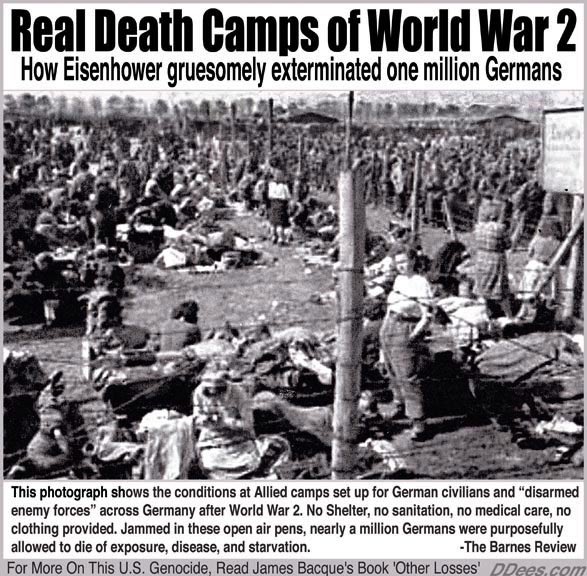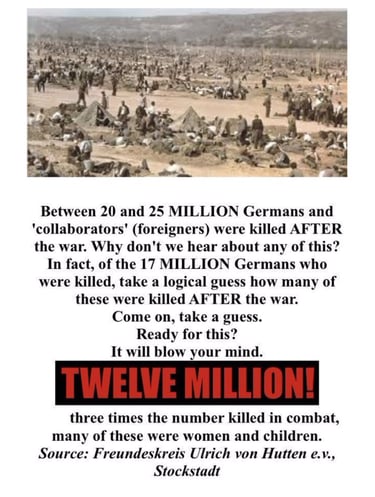Eisenhower's Death Camps?
Did you know that USA General Eisenhower killed more Germans after WW2 had ended than he did during the war itself?
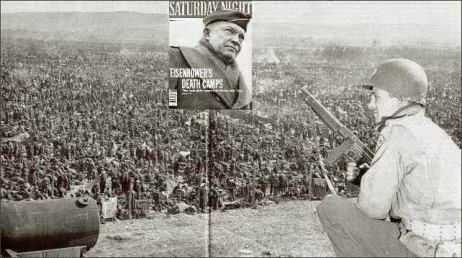

Dwight Eisenhower was a war criminal of epic proportions. His policy killed more Germans in peace than were killed after D-Day in war. After Germany had surrendered the Americans were faced with having 5 million German prisoners. These German soldiers were herded into 30 separate camps. In these camps there were no tents, buildings, cooking facilities, water, toilets, or food. It was just a massive open field with barbwire fences around it. The prisoners had to sleep in the open and some of them would dig holes in the ground to sleep in. It is known, that the Allies had sufficient stockpiles of food and medicine to care for these German soldiers. This was deliberately and intentionally denied them. Many men died of gangrene from frostbite due to deliberate exposure. Local German people who offered these men food, were sent away on Eisenhower’s command. General Patton's Third Army was the only command in Europe to release a significant numbers of Germans.
To allow Eisenhower to get away with this mass murder he changed the designation of the prisoners from "Prisoners of War" (P.O.W.), required by the Geneva Convention to be fed the same rations as American G.I.'s, to "Disarmed Enemy Forces" (D.E.F.).
George Weiss was a German tank repairman and he said ‘"All night we had to sit up jammed against each other. But the lack of water was the worst thing of all. For three and a half days, we had no water at all. We would drink our own urine". Two colonels in the U.S. Army Medical Corps, James Mason and Charles Beasley described the conditions in one of the camps "Huddled close together for warmth, behind the barbed wire was a most awesome sight, nearly 100,000 haggard, apathetic, dirty, gaunt, blank-staring med clad in dirty field grey uniforms, and standing ankle-deep in mud and the men had not eaten for at least two days, and the provisions of water was a major problem”. General Eisenhower refused to let the Red Cross into the camps to give out provisions and this was against the Geneva Convention. It is estimated that up to 1.7 million of these German prisoners of war died of starvation and disease. It was nothing more than mass murder. Had the Germans done this to the Allied prisoners then we would have heard about it in movies and documentaries but because it was done by the Americans against the Germans not many people know about it. In fact if the Germans had done this to the Allies there would have been a movie made about it. After the German surrender was signed shouldn’t the German prisoners of war just be then freed and allowed to go home just like the Allied prisoners of war were.
Former American WW2 soldier Martin Brech was with the Company C, 14th Infantry Regiment, during his seventeen-month stay in Germany and he states:
“In late March or early April 1945, I was sent to guard a POW camp near Andernach along the Rhine. I had four years of high school German, so I was able to talk to the prisoners, although this was forbidden. Gradually, however, I was used as an interpreter and asked to ferret out members of the S.S. (I found none.)
In Andernach about 50,000 prisoners of all ages were held in an open field surrounded by barbed wire. The women were kept in a separate enclosure that I did not see until later. The men I guarded had no shelter and no blankets. Many had no coats. They slept in the mud, wet and cold, with inadequate slit trenches for excrement. It was a cold, wet spring, and their misery from exposure alone was evident.
Even more shocking was to see the prisoners throwing grass and weeds into a tin can containing a thin soup. They told me they did this to help ease their hunger pains. Quickly they grew emaciated. Dysentery raged, and soon they were sleeping in their own excrement, too weak and crowded to reach the slit trenches. Many were begging for food, sickening and dying before our eyes. We had ample food and supplies, but did nothing to help them, including no medical assistance”.
Martin Brech lives in Mahopac, New York. When he wrote this memoir essay in 1990, he was an Adjunct Professor of Philosophy and Religion at Mercy College in Dobbs Ferry, New York. Brech holds a master's degree in theology from Columbia University, and is a Unitarian-Universalist minister.
The respected Associated Press Photographer, Henry Griffin who had taken the pictures of corpses in Buchenwald and Dachau when visiting Allied POW camps agreed: "The only difference I can see between these men and those corpses is that here they are still breathing."
By August 1946 France according to the International Red Cross had enslaved nearly three-quarters of a million former German servicemen. Of these 475,000 had been captured by the Americans who ‘in a deal’ had transferred them to French control for the expressed purpose of forced labour.
By contrast the German armed forces behaved impeccably towards their prisoners-of-war. "The most amazing thing about the atrocities in this war is that there have been so few of them. I have come up against few instances where the Germans have not treated prisoners according to the rules, and respected the Red Cross reported respected newspaper” The Progressive February, 4th1945.
Allan Wood, London Correspondent of the London Express agreed. "The Germans even in their greatest moments of despair obeyed the Convention in most respects. True it is that there were front line atrocities - passions run high up there - but they were incidents, not practices, and misadministration of their American prison camps was very uncommon."
US Assistant Judge Advocate, Jefferson Barracks, April 27th1945. "It is true that the Reich exacted forced labour from foreign workers, but it is also true that, they were for the most part paid and fed well."
Many believe that Eisenhower was just a Jewish lackey who was there to make sure that as many Germans as possible were murdered after the war had ended. In fact when Eisenhower was a colonel and under the command of Gen. Douglas MacArthur in the South Pacific, MacArthur protested to his superiors in Washington (DC) that Eisenhower was incompetent and that he did not want Eisenhower on his staff.
In 1941, the year the USA went to war, Eisenhower or "Ike", was a lieutenant colonel who had never seen a battle in his life. In 1943 the American Government then made the unbelievable decision to not only transferred Col. Eisenhower to Europe but promoted him over more than 30 more experienced senior officers to five star general and placed him in charge of all the US forces in Europe. It was really was an unbelievable decision because D-day and the European war was such a huge operation for someone with so little experience. Patton would have been a better choice.
The question is did Eisenhower have any Jewish ancestry or was it because he hated Germans so much and therefore not liable to treat them humanely. Maybe that is why he was put in charge. "God, I hate the Germans..." --Dwight David Eisenhower in a letter to his wife in September, 1944.
Below a Florida newspaper suggests 992,000 German prisoners were killed in April 1945.
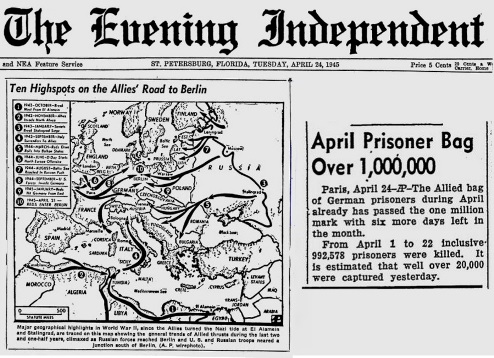

Below is a picture of one of Eisenhower’s Rhineland death camps at Sinzig-Remagen, spring, 1945.
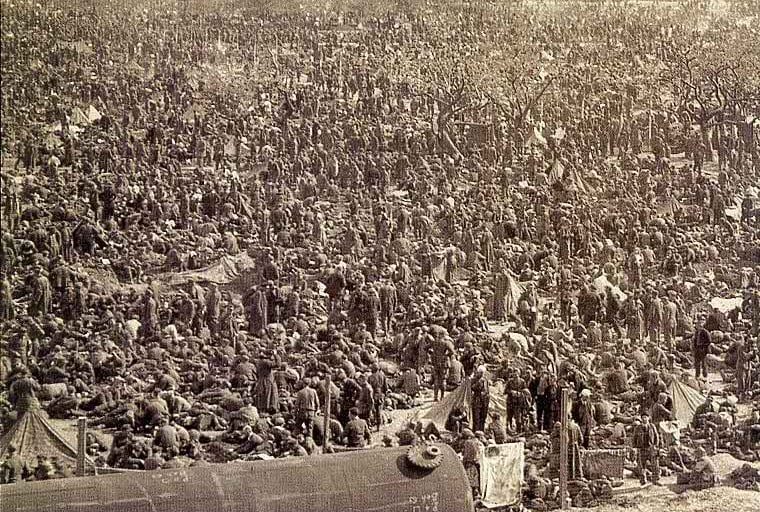

Video: The untold story of Eisenhower's Rhine Meadows Death Camps - A Deliberate Policy of Extermination of the Surrendered German forces by the Allies in post war Germany (Rheinwiesenlager). Full documentary, plus additional background information, and a memorial for the victims. A German language film, translated to English, re-edited, narrated, and published by Justice for German
Part 1 The 'Rheinwiesenlager' German language documentary translated into English, with additional information and interviews (50 minutes)
Part 2 Deanna Spingola reads a chapter from her book dealing with the subject of these camps and provides additional background information regarding the perpetrators and their policies (30 minutes)
Part 3 A Memorial March for the victims of these camps held in Remagen, Germany in 2011, also translated / narrated in English (10 minutes)
